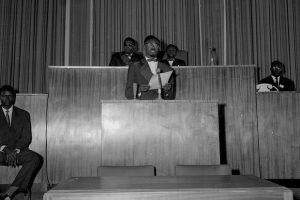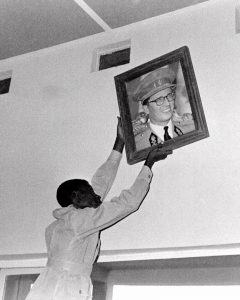
Patrice Lumumba’s Independence Day speech stands as a capsule in time, reading it and watching it you see the encapsulation of Congolese and African decolonisation in the 1960s; the righteous indignation and fury aimed at the colonial powers, language gently coated with Marxism, and a desire to carve out a better future for Congo and the African continent. It was a speech laden with possibility, as the destiny of this new fledgling nation-state was ready to be determined – immense possibility to “make Congo the pride of Africa” in Lumumba’s own words. In his speech he vows to never forget the brutality the Belgians unleashed on the Congo basin, he vows to continue the ‘struggle’ for economic independence, and he reiterates the need for the Congolese to “set themselves resolutely to the task of creating a national economy”. The themes are clear, castigation of the colonial legacy, recognition of ‘struggle’ and a discourse laced with soft-Marxism, as well as Congolese citizenship. This short discourse analysis will attempt to analyse all three of these themes throughout the speech, and look at how the language used reveals Lumumba’s ideals, and the reactions that language sparked across the Western world.
Of course, Lumumba’s speech didn’t happen in a vacuum – first we must contextualise his words. From 1885 to 1960 the Congo had been ruled by Belgians, first King Leopold II who ruled the river basin as his own personal fiefdom in which millions of Congolese died (estimates vary, one estimate notes that the population of the Congo fell by 11.5 million people). Leopold then relinquished control to the Belgian state in 1908 and they ruled the nation until 1960 when independence was achieved on the 30th June 1960. Independence arrived, much like Lumumba, in a fervent rush. As late as 1958 the Belgians were mapping out routes that would attempt to placate the desire of Congolese self-determination, but by January 1960 they had caved in and declared that independence would arrive six months later in June of that year, the date of which Lumumba would give his speech. (It is interesting to note here that the decolonisation decision and process was so rushed that the fledgling nation did not have a national anthem ready by independence day) Lumumba went on to win the first Congolese elections in May (despite the meddling invisible hand of the Belgians), and in June when independence arrived he would become the Congo’s first democratically-elected Prime Minister – a joyous and cathartic moment. Independence Day was upon the Congo, and as they gleefully danced to Joseph Kabasele’s “Independence Cha Cha”, there seemed little that could dampen their spirits. That was before the then Belgian King arrived for the independence ceremony to hand over the keys to the nation, and its wealth of minerals, to Lumumba and the Congolese. King Baudouin’s speech was full of praise for the Belgian colonial regime. As reported by The Guardian at the time, the King praised “the genius of King Leopold II” and stressed that the Belgian colonisers “deserve admiration from us and acknowledgement from you” – the speech was tone deaf at best, and crass at worst.
Nevertheless, this is the context surrounding Lumumba’s independence day speech – a brutal colonial regime that lasted almost a century, a hasty decolonisation process that saw interference and bloodshed, and on a cathartic day the King of the colonial power had pronounced the supposed virtues of the Belgian regime. This is important background to what Lumumba says, because it dictates what he says and the manner in which he says it, specifically the words chosen. The speech is broadly divided into two parts, the first part focusing on the past injustices the Congolese have had to endure, and the struggle to break free from those injustices and the second part focusing more on the future and what lies ahead.

The tone of the speech is set from the very start, he addresses the Congolese as “victorious independence fighters” – this language is rousing and paints the Congolese who are watching and listening not only as people who fought in a struggle, a war but as the victors of that war. It immediately makes every Congolese see themselves as the victors – this is only reinforced by the line before in which he addresses “men and women of the Congo”, Lumumba isn’t talking about a select group, he is including everybody from the Congo in his framing. This is significant as it signals Lumumba’s intent to reject divisive ethnic politics, which the Belgians had tried to stoke. He then goes on to say “I salute you in the name of the Congolese government”, once again painting the Congolese as fighters – a salute is typically saved for soldiers – but crucially he is also legitimising himself here. The Belgians are no longer the rulers, they can no longer speak for the Congo – Lumumba now represents the Congolese government, and it is a government of Lumumbas.
He goes on to allude to conflict and the military – “my friends, who tirelessly fought in our ranks” he says, and implores those friends in the ‘ranks’ (typically a military description) to engrave the 30th June 1960 in their hearts, “the glorious history of our struggle for freedom”. Here, we must pause and note how often Lumumba alludes to ‘struggle’. In the political world using the word ‘struggle’ is a signifier of left-wing politics – as Karl Marx and Friedrich Engels wrote in The Communist Manifesto “the history of all hitherto existing society is the history of class struggles”. Believing in a constant struggle against greater forces, of the masses struggling against a privileged few is a key tenet of Marxism in all its shades, and Lumumba’s use of the word is noteworthy. He goes on to use the word struggle seven times. The word struggle on its own wouldn’t denote Marxist sympathies but throughout the speech Lumumba urges Congo to achieve “economic independence” and longs for an “independent and sovereign Congo”. When coupled with the knowledge that Lumumba had plans to keep profits from the mining industry firmly within his country’s border and seek what was essentially nationalisation, it was easy to see why his rhetoric could be interpreted as being gently coated with Marxism. It was something that frightened Belgian vested interests who wanted to keep the money flowing to Brussels, as well as the new global superpower the United States whose Secretary of State John Foster Dulles dubbed Lumumba “Congo’s Castro”. It is with this background that the words “national economy” uttered by Lumumba sent shudders down the spines of Western powers.

Lumumba – in what can only be described as a direct rebuke to the Belgian King – derides the colonial legacy, and spits at all the injustices. He decries every facet of Belgian colonialism, from the “jeers, insults and blows because we were ‘negroes’… the black was addressed as “tu”… because the polite “vous” was reserved for the white man” to “the atrocious sufferings… forced labour in exchange for pay that did not allow us to satisfy our hunger… our lands seized… the shootings which killed so many of our brothers”. Lumumba spends a significant chunk of his speech spitting at the legacy of Belgian colonialism – something that may not have happened had the aforementioned speech by King Baudouin not occurred. The Guardian reports that Baudouin’s speech was so badly received that the incoming Head of State Joseph Kasabuvu chose to omit praise for the King in his remarks. This highlights how the context of the speech dictated Lumumba’s discourse. “Our wounds are too fresh and much too painful to be forgotten”, Lumumba says – it sparks a physical reaction and conjures a visceral image of the suffering the colonised had to endure.
After castigating colonialism in the first part of the speech, Lumumba sets his sights on the future and evokes the themes we’ve just seen. There is an appeal to all Congolese across ethnic lines, “I ask you all to sink your tribal quarrels… I call on all Congolese citizens, men, women and children”, and there is soft-Marxism, “let us commence together a new struggle… we shall establish social justice and ensure for every man a fair remuneration for his labour.”
What, then, can we take from this discourse analysis of Lumumba’s Independence Day speech? If we take the word of some of the Western press that were at the scene, it “soured the taste of many”. Whether that is true or not Lumumba’s speech did indeed set the tone for his brief Premiership and its failure – his attempts to create a Congolese civic nationalism failed as Katanga seceded within days of his Premiership. His rhetorical soft-Marxism scared the Western powers and would contribute to his downfall, and his justified castigation of the Belgian colonial legacy soured relationships with the former power immediately. Nevertheless, Lumumba’s speech still stands as a monument in time – the anticipation of independence and possibilities that came with it are evident in the speech, but with hindsight we can see that the speech alludes to the phenomena that would eventually push Lumumba out of power, and lead the Congo to ruin.
Sources:
L. James, Empires in the Sun: The Struggle for the Mastery of Africa, Weidenfeld & Nicolson, 2016
P. Lumumba, Speech at The Ceremony of The Proclamation of the Congo’s Independence, 30th June 1960, retrieved from: https://www.marxists.org/subject/africa/lumumba/1960/06/independence.htm
“Marred: M. Lumumba’s Offensive speech in the King’s Presence”, The Guardian, 1st July 1960, https://www.theguardian.com/world/1960/jul/01/congo
L. Zeilig “Léopold’s Congo.” In Lumumba: Africa’s Lost Leader, Haus Publishing, 2008, www.jstor.org/stable/j.ctt1hfr315.3


Mirjam de Bruijn
October 7, 2020 (16:21)
Lumumba himself was clearly aware of the language he used and the references to ideologies of the left. The analysis of the speech needs a context that you provide the reader with. You could have analyzed the visual expressions as well, as you took the video as your point of departure.